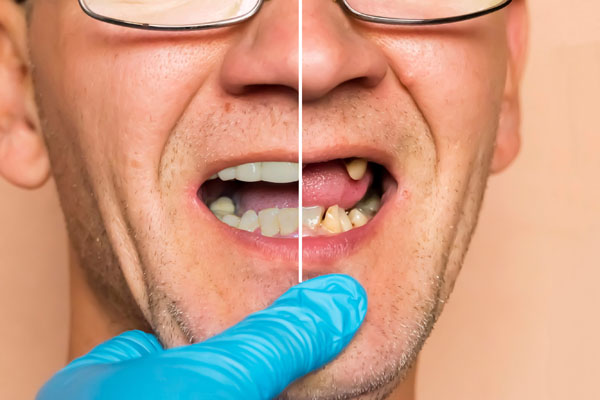 A dentist’s job is to make sure your teeth stay in great health. For many patients, this means considering the benefits of dental restorations. Dentists recommend restorative procedures when a patient has a damaged, diseased, or missing tooth. These standard treatments stop the problem in its tracks, prevent additional injury and infection, and even provide cosmetic benefits.
A dentist’s job is to make sure your teeth stay in great health. For many patients, this means considering the benefits of dental restorations. Dentists recommend restorative procedures when a patient has a damaged, diseased, or missing tooth. These standard treatments stop the problem in its tracks, prevent additional injury and infection, and even provide cosmetic benefits.
What are dental restorations?
Dental restoration involves supplementing existing teeth with synthetic materials. Traditionally, dentists have used metals and composite resin, but ceramic and porcelain parts are increasingly common due to their more natural appearance. Restorative work provides teeth with the necessary repairs, protection, and structural integrity to maintain optimal health.
Common restorative dentistry practices include:
- Fillings
- Crowns
- Bridges
- Dentures
- Implants
- Veneers
When would a dentist recommend dental restorations?
Dentists recommend dental restorations when a tooth or gum concern diminishes your oral health, the functionality of your teeth, or even your self-esteem. The most effective restorative procedure depends on the condition of your teeth and the problem you need to treat.
When you have a cavity
Cavities, or tiny holes, form when a patient fails to maintain good oral hygiene. Because cavities are so common, dentists often find themselves recommending dental fillings to combat them.
When a cavity wears down a tooth, a common way to prevent further damage is to fill the damaged area with synthetic materials. Fillings block harmful bacteria from exacerbating the cavity and restore the tooth’s healthy appearance and functionality. Dentists often recommend fillings as a preventative measure rather than a reactive one.
When you have a cracked, chipped, or missing tooth
If you have an externally-damaged tooth, the impact is more than just aesthetic. Even slight changes to a tooth’s structure degrade its integrity, putting the tooth at risk for injury or infection.
Crowns provide an ideal solution for restoring cracked, chipped, or missing teeth to their original condition. Built to resemble the shape and consistency of natural teeth, a crown sits on top of a damaged tooth to give the illusion that the tooth is still intact. Bridges, which consist of multiple crowns strung together, are ideal for filling the gap caused by a missing tooth, as open wounds invite bacteria and infection.
When you struggle with confidence
Sometimes, a dentist’s reason for recommending restorative dentistry has less to do with the patient’s physical health. If a patient has noticeable gum or teeth concerns that detract from their self-esteem, a dentist might recommend restorative work.
Although restorations are not intended to be cosmetic fixes, most dental repairs do improve a patient’s smile and confidence. Since ceramic and porcelain materials contribute to a more realistic appearance, dentists may suggest veneers to patients wanting a professional, polished touch.
Conclusion
Dentists recommend dental restorations when a patient presents with damaged, diseased, or missing teeth. Without protection, impaired teeth continue to deteriorate and can eventually lead to dental decay, tooth death, or systematic infection. These restorative practices primarily aim to improve a patient’s oral health, but patients looking for cosmetic enhancements benefit from the resulting fuller, healthier smile.
Request an appointment or call La Verne Dental & Implant Center at 909-575-1034 for an appointment in our La Verne office.
Related Posts
There appears to be some overlap between dental restorations and cosmetic dentistry. However, people need to know the difference between the two because dental insurance may cover a dental restoration but not a cosmetic procedure. This article examines the key differences between the two types of dentistry and provides examples of each.The primary difference between…
You may need a type of dental restoration at some point in your life. There are many types of treatments available. Knowing how to select each one can give you the results that you need. Here are some tips on how to choose the right type of dental restoration procedure that will fit your dental…
The purpose of dental restorations is to replace permanent teeth that are lost. This can happen because of trauma to the tooth that renders it irreparable or decay that is so extensive that it requires extraction. There are several restoration options for replacing a missing tooth. Some are removable while others are permanently fixed in…
